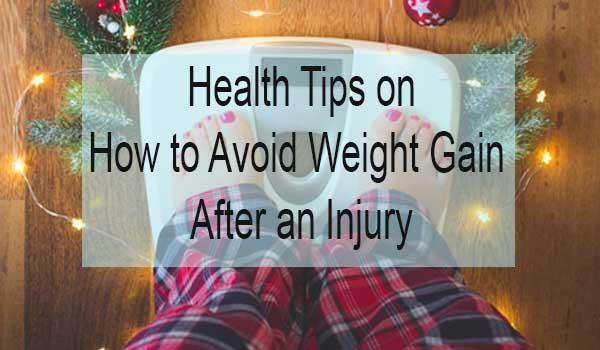Injuries can be short-term, or they can be long-term. There are different types of injuries you may have to deal with.
For example, you might have an overuse injury causing pain preventing you from working out, or you could have a more severe injury. Car accidents often lead to serious injuries that require significant recovery time.
Regardless of the source of your injury, when you’re recovering, even if you can’t work out like you normally would, you likely still want to stay fit and healthy.
How can you do that and avoid weight gain after an injury?
Navigator
Think About What You Can Do
Depending on your injury, there may be activities you definitely can’t do, but there can also still be some you can do.
If you’re injured and you want to stay healthy, active and avoid weight gain, options might include:
- Get in the pool. If your gym or community center has a pool, or if you have one at home, use it as you recover from your injury, as long as your health care provider gives you the go-ahead. You can aqua jo,g for example, especially if you’re usually a runner and can’t do that right now. You can burn a lot of calories and anything you do in the pool also adds resistance even though it’s low-impact.
- Do strength training with bands. Again, depending on the specifics of your injury, you might not be able to lift weights, but you could perhaps use resistance bands. Resistance bands are a low-impact and often safe alternative to free weights that can keep your muscles strong.
- Think about yoga or Pilates. Yoga and Pilates are good to not just keep you in shape as you recover from an injury, but they may even help you heal faster. They can help you with core strength so you can lower your risk of a future injury, and they’re good for your mindset and mental health.
- Try biking. If you can’t bike outdoors, maybe you can invest in a stationary bike.
Even if you don’t do a structured workout, a good way to avoid weight gain during injury recovery is to move your body as much as that injury allows. Don’t overdo it though, because that can end up making your recovery take longer.
Day-to-day activities that can help you keep weight off include walking more in parking lots, doing chores, or just spending some time outside with your family.
Avoid Traps
All of us have our own traps and triggers when it comes to health and wellness.
If you’re injured, be honest with yourself about what yours are and work to avoid them. For example, maybe your portions or too big, or you’re prone to mindlessly snacking.
Whatever your traps and triggers are, make it a priority to stop them before they lead to weight gain.
Watch Your Calorie Intake
If you’re used to regularly exercising or being fairly active and suddenly you can’t be, you’re inevitably going to have to adjust your diet. This means primarily reducing your calorie intake. If you’re moving significantly less than you were before your accident or injury, then the math simply indicates you should take in fewer calories because you’re burning fewer.
There are a lot of ways to reduce your calories.
Maybe you have smaller portions, or you eat fewer snacks, for example. Also, watch out for a lot of empty calories you might be getting from drinks like juice and alcohol.
Eat Plenty of Protein
If you decrease the number of calories you take in, you might feel hungrier. Avoid that by increasing your protein intake as you recover from your injury. Protein is satisfying and will help you feel fuller for longer, without putting on extra weight.
Protein can help you maintain your muscle mass during your injury recovery period, and it can even help you heal faster because it gives you amino acids that your body can use to repair itself.
Similarly, rather than consuming a lot of carbs, which you might have done previously to fuel your workouts, try to swap them out for healthy fat. Much like protein, healthy fats help you feel fuller, and they can aid in recovery and repair after an injury.
Healthy sources of fat include salmon and other cold-water fish, avocadoes, olive oil, and nuts and seeds.
Finally, drink lots of cold water. We often confuse thirst with hunger. If you think you’re hungry, drink a glass of water first and then see how you feel.


